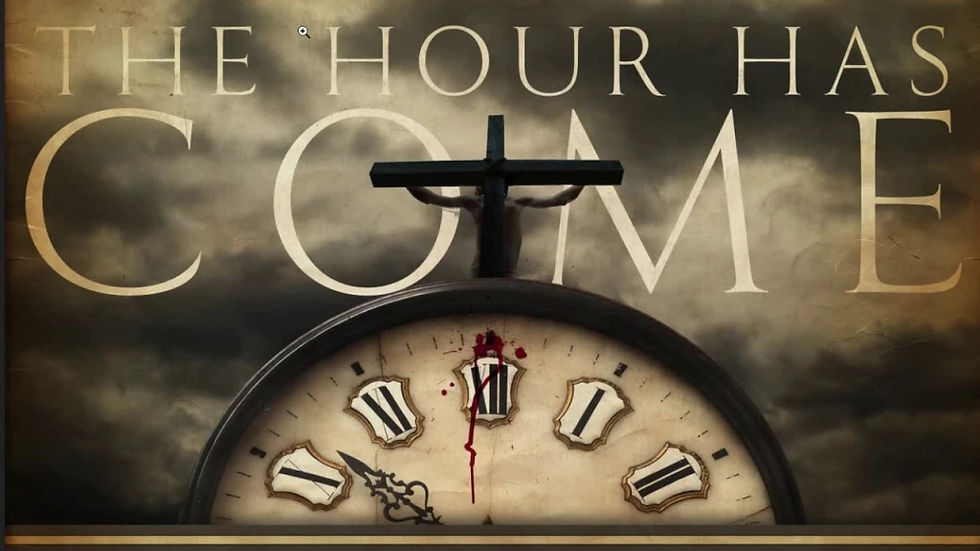THE HOUR HAS COME
- Charles
- 16 mars 2024
- 3 min de lecture
Reflections for the Fifth Sunday of Lent (Jeremiah 31:31-34; Hebrews 5:7-9; John 12:20-33)

On at least five different occasions in the Gospel of John, Jesus insists that his “hour has not yet come”.
Ø At the Wedding at Cana, Mary, the Mother of Jesus intercedes for a distressed family saying, “They have no wine” and Jesus replies, “Woman, what concern is that to me and to you? My hour has not yet come” (John 2:4);
Ø During the Festival of Booths/Tabernacles, the brothers of Jesus offer him career advice. They want him to ‘go public’ with his ministry and move from Galilee to Judea (even though the Jews were looking to kill him) so his disciples may also ‘see his works’ and so ‘he could be widely known’. Jesus replies, “My time has not yet come, but your time is always here” (John 7:6);
Ø At the Jerusalem Temple, people ask, “Is not this the man whom they are trying to kill? And here he is, speaking openly, but they say nothing to him!”. Why not arrest him? John clarifies, “No one laid hands on him because his hour had not yet come” (John 7:30, 8:40). Again in the Treasury of the Temple, Jesus is seen teaching publicly but no one arrested him, as again John clarifies, “because his hour had not yet come” (John 8:20).
This long evading ‘hour’ of Jesus finally arrives in today’s gospel. Jesus says, “The hour has come for the Son of Man to be glorified” (John 12:23). The ‘hour’ that we had awaited all along Jesus’ itinerary through Cana, Sychar, Judea, and Jerusalem is finally here. What is so special about the hour? Why the long wait? The hour of Jesus is not merely a key moment or event but a decisive phase of a long process that God initiated for all creation's salvation.
1. Hour of Glory via the Cross:
Interestingly, this “hour”, which Jesus characterises as the privileged time of his glorification is also the hour of his entry into his passion, suffering on the cross, and death. How could the hour of the cross be glorious? Jesus responds with an interesting metaphor: “Unless a grain of wheat falls to the ground and dies, it remains just a grain of wheat; but if it dies, it produces much fruit”. For a grain of wheat, glory does not consist in being shelved in a warehouse but in falling to the ground, being buried, and dying so that it can produce fruits, which is its ultimate purpose. Passion is glorious because it is his purpose. Therefore, Jesus prays not to be saved from this hour, but declares, “It was for this purpose that I came to this hour”. The ‘hour’ marks the glorious fulfilment of his ultimate purpose: salvation via his passion and death.
2. Hour of Life via Death:
Jesus takes upon himself the consequences of our culture of death so that we may embrace the culture of life. The ‘hour’ is not a time of violence, death, and gloom, but the hour when life resurrects from death. The hour is the time of spring, rebirth, and regeneration. Interestingly, death becomes the door to life. Jesus clarifies, “Whoever loves his life loses it, and whoever hates his life in this world will preserve it for eternal life”. Dying to self is integral to the hour of life. “Hating ‘one’s life’ is about preferring divine life to the many masks of the worldly culture of death that characterises our society. We no longer live the way this world lives (Romans 12:2) but the counter-cultural way of living in, for, with, and through Christ. In this ‘hour’ of the new covenant (first reading), the law is placed ‘within’ us and written upon our hearts so that ‘He will be our God, and we shall be His people’.
3. Hour of Church beyond boundaries:
Interestingly, it is the arrival of the Greek ‘searchers’ that reveals/unveils the ‘hour’ of Jesus. These ‘foreigners' had come to Jerusalem for the Passover, meaning, they were already in search of God. They approach Philip (his Greek name is relevant here) and with Andrew, they meet Jesus. The ‘hour’ of Jesus brings together Greeks and Jews, fulfilling Jesus’ earlier promise, “When I am lifted up from the earth, I will draw everyone to myself” (John 12:32). The hour births the Church, the new Israel, where Jews and Gentiles, men and women, the slave and the free find their place in the body of Christ. May this privileged ‘hour’ of Lent inspire us to embrace the glory of the cross, enable us to travel from the worldly culture of death to the counter-cultural way of life in Christ, and make us living stones of the Church that breaches boundaries.




Commentaires